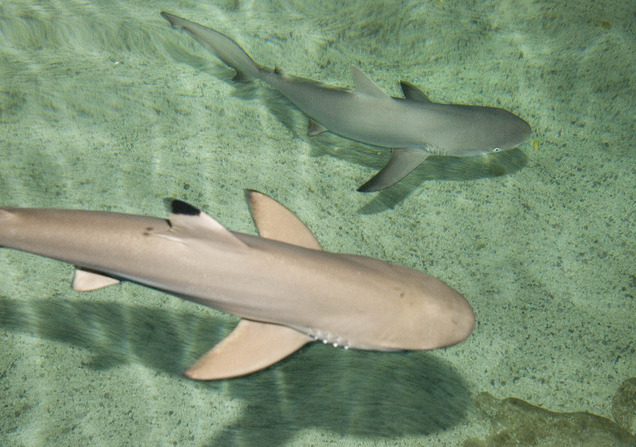shut things down or turn things up for them; they would be
head to head with the hacker nerding out on a computer a
few seats away. Should be scary if you are really thinking
about it!


Baby sharks are being born smaller, undernourished and exhausted as climate change warms the world’s oceans, researchers say.
Researchers examined the effects of warming temperatures on the growth, development and physiology of the Great Barrier Reef’s epaulette sharks off Australia, testing embryos and hatchlings in waters up to 31 degrees Celsius (87.8 degrees Fahrenheit).
The research team found that in warmer waters, shark embryos grew faster and used their yolk sac — their only source of food in this developmental stage — quicker. The creatures hatched earlier, were born smaller and needed to feed straight away, but lacked energy, researchers from Australia’s ARC Centre of Excellence for Coral Reef Studies at James Cook University and the University of Massachusetts said Tuesday.
There are more than 500 types of shark living around the world, and the majority give birth to live young. Some shark species, like
epaulette sharks, lay eggs, which are left unprotected and must be able to survive on their own for up to four months.
“The epaulette shark is known for its resilience to change, even to ocean acidification,” Jodie Rummer, co-author and associate professor at the ARC Centre of Excellence for Coral Reef Studies, said in a statement. “So, if this species can’t cope with warming waters, then how
will other, less tolerant species fare”.
The Great Barrier Reef is the world’s largest coral reef, covering nearly 133,000 square miles, and is home to more than 1,500 species of fish, 411 species of hard corals and dozens of other species.
The past decade has been the warmest on record for global ocean temperatures. By the end of the century, the Great Barrier Reef is likely to experience average summer temperatures close to or exceeding 31 degrees Celsius, researchers warn.
Najib Mikati promises justice for Irish UN peacekeeper killed in Lebanon
Lebanon is determined to uncover the circumstances that led to the killing of an Irish UN peacekeeper, caretaker prime minister Najib Mikati said during a visit to the headquarters of the UN Interim Force in Lebanon (Unifil) on Friday. Private Sean Rooney, 23, was...
US appeals court says lawsuit against Lebanese bank can proceed
A US court of appeals has ruled that cases against Lebanese commercial banks can be tried outside Lebanon, paving the way for more cases by depositors seeking to unlock their frozen funds. The court decision, issued on Thursday in a case brought by Lebanese depositors...
Submit your event
We will be happy to share your events. Please email us the details and pictures at publish@profilenewsohio.com
Address
P.O. Box: 311001 Independance, Ohio, 44131
Call Us
+1 (216) 269 3272
Email Us
Publish@profilenewsohio.com

